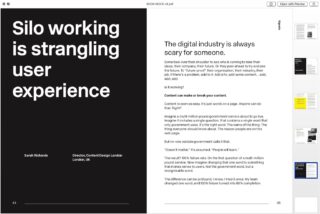
The digital industry is always scary for someone. Some look over their shoulder to see who is coming to take their ideas, their company, their future. Or they peer ahead to try and see the future. To “future-proof” their organisation, their industry, their job. If there’s a problem, add to it. Add a fix, add some content… add, add, add.
Is it working?
Content can make or break your content.
Content is seen as easy. It’s just words on a page. Anyone can do that. Right?
Imagine a multi-million pound government service about to go live. Imagine it includes a single question, that contains a single word that only government uses. It’s the right word. The name of the thing. The thing everyone should know about. The reason people are on this web page.
But no-one outside government calls it that.
“Doesn’t matter,” it’s assumed. “People will learn.”
The result? 100% failure rate. On the first question of a multi-million pound service.
Now imagine changing that one word to something that makes sense to users. Not the government word, but a recognisable word.
The difference can be profound. I know. I tried it once. My team changed one word, and 100% failure turned into 88% completion.
Disruptive tech
We’ve seen small start-ups disrupt a large, established industry overnight. The small, user-centred teams that characterise those start-ups have one thing in common.
It’s not the shared passion or the dreams. It’s not the beanbags and avocados.
They don’t have boards of people making decisions. They don’t have 27 people who have to approve every piece of content. They understand value and success can be 2 different things, and define both. They measure intention, not traffic.
They talk to their audience every 2 weeks. They listen every 2 weeks. They iterate. They communicate. Take away communication and all you have are dreams.
Without communicating to the team or the audience, communicating the vision and direction, the boundaries, that’s all they are. Dreams in your head.
Successful projects aren’t successful because of dreams. Successful projects aren’t successful because of tech.
Success is because of people
Failure will always come from within. So hire people you trust. Then let them get on with their work. Give boundaries. Give direction. Give space.
Every piece of work you produce must have a reason for being. You paid money (more than you think usually) for it to exist. You’ve hired your team. So trust them. Let them do their jobs.
Multidisciplinary teams
You “work together”. Do you? Really? Or do you do your part of the work and ‘throw it over the wall’ to another team to do their bit?
Look at user journeys as one team: comms, marketing, legal, digital, design, content, dev. Forget which team you came from. You are not in marketing now. You are not in digital now. You are not in legal now. You are in the team that is going to make this thing work.
If you are a leader then lead, don’t manage. If you are a manager then manage, don’t interfere. If you are someone who does, expect your leaders to trust that you have the skill. Because your audience couldn’t care less what team you are in.
This book is about signals. Emerging ideas. I wouldn’t worry about blockchain or voice search until your teams stop working in silos. Tech won’t solve a problem if the foundations are weak. Tech won’t solve a problem if your content isn’t up to the task.
You need to communicate well. You need your content. Not more content, smarter content. Good content that serves a user need. Content that earns its keep. Don’t just add content; your communication will become noise. Lost in other noise.
You lose.